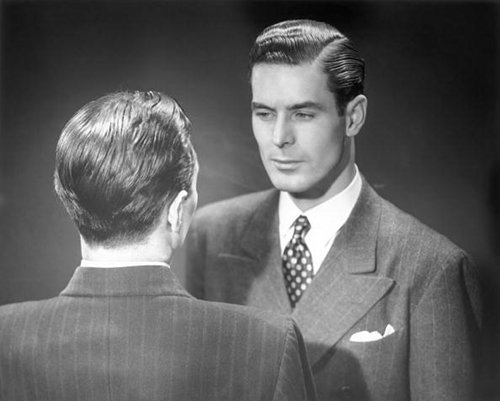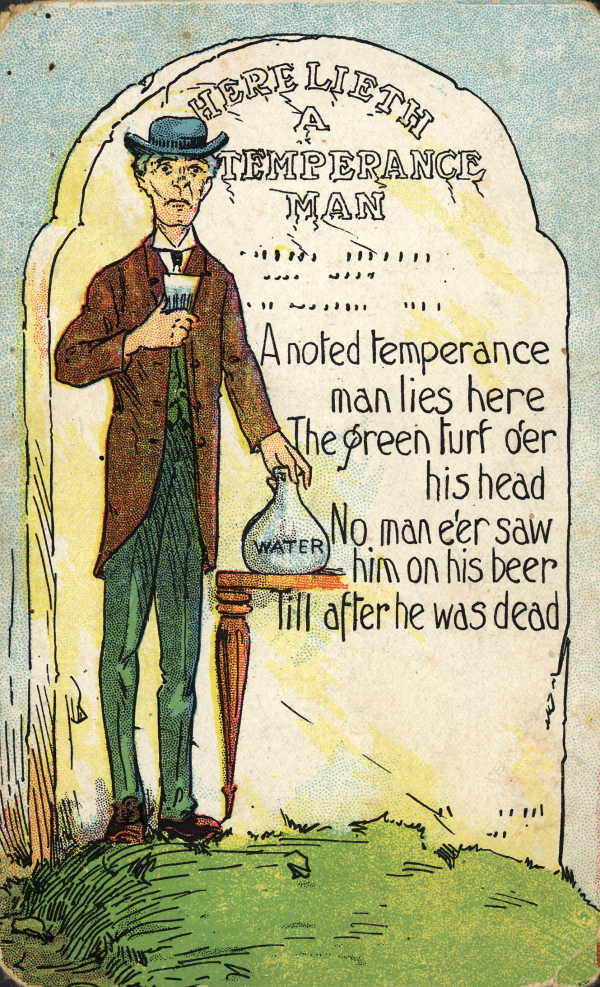
In our first post in this two-part series on eye contact, we discussed the importance of eye contact and some of the reasons we don’t always feel comfortable looking someone in the eye.
But just because eye contact is a great thing and a vital tool for improving the quality of all your face-to-face interactions with others, doesn’t mean that more eye contact is always better or that all eye contact is created equal. You have to do it right—at the right time and in the right way. How to do that is what we’ll be exploring today.
We’ll start off with a primer on how to make good eye contact in general conversational situations, and then we’ll tackle eye contact tips for specific scenarios. Let’s get started.
General Principles for Making Effective Eye Contact
Eye contact begets eye contact. You might be hesitant to make eye contact with people because you don’t think they want to make eye contact with you. And sure enough, when you look at them the first time, they look away. But they’re probably looking away because they’re thinking the same thing you did; that you don’t really want to make eye contact with them! Even though you made the first move, they’re still worried about rejection. But most people are just waiting for permission to get into a mutual gaze. Studies have shown that once one person in a conversing pair initiates greater eye contact, the other person will follow suit and increase his or her own level of eye contact as well.

But don’t be a creeper. In order for eye contact to be effective, it needs to be welcome and appropriate. When eye contact is unwanted, it goes from gazing to staring, and being stared at makes people uncomfortable. Eye contact results in physiologic arousal—it increases prefrontal brain activity and activates the sympathetic nervous system, speeding up a person’s heart rate, perspiration, and breathing. And this happens not only when you’re directly looking into someone’s eyes, but also when you simply perceive that someone is staring at you. This arousal can be a good thing–if you and a lovely lady are looking into each other’s eyes, it can create a more intense connection. But when someone fixes their gaze on you in a creepy way, it can feel as if a predator is stalking you in the wild; it sets off your threat-o-meter.
Thus good eye contact is based on mutuality. As Michael Ellsberg, author of The Power of Eye Contact, puts it:
“In order for eye contact to feel good, one person cannot impose his visual will on another; it is a shared experience. Perhaps eyes meet only for a second at first; one partner then tests the waters and tries a few seconds, and when that is met warmly, the pair can begin ramping up the eye contact together until they are locked in a beautiful dance of eyes and gazes.” [emphasis mine]
After you’ve made two attempts to initiate eye contact with someone, if they don’t reciprocate at all, give it up.
When you’re with someone you’re not as familiar with, lean back as you increase your eye contact. The bit of added space between you balances out the greater eye contact you’re making, allowing the receiver of your gaze to feel more comfortable and keeping the intimacy level from ramping up too quickly. Conversely, when someone is talking to you about something intense and personal, lean in as you hold their gaze to show that you’re giving them your full attention.
Focus on one eye at a time and switch between them. When you’re sitting close to someone, you can’t actually look at both of their eyes at the same time, and if you try to, your gaze will become off-putting and laser-like. You may have never stopped to think about it, but when you look someone in the eye, it is literally just their eye; you look at one of their eyes at a time. You probably already have one eye (the left or the right) that you tend to focus on, but it’s good to switch your gaze from one eye to the other during a conversation (it looks more natural and show more attention and interest). Don’t flit your gaze between their eyes too frequently—you don’t want to appear as if you’re watching a ping-pong match. Smoothly and naturally.
Some people suggest that since you can’t look in both of a person’s eyes at the same time, you should just stare at the bridge of his or her nose. But people can sometimes tell you’re doing that, making the tactic seem artificial and even manipulative.
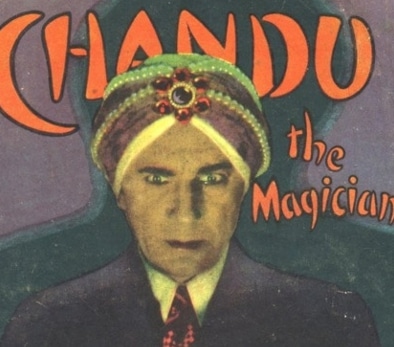
Don’t overdo it. More eye contact is good…up to a point. You don’t want to lock eyes with someone for an entire conversation. About every 5 seconds, or about the time it takes to speak a single sentence, look away from their eyes for a beat and then back again. Find a natural rhythm–don’t be counting the seconds in your head.
If you feel lost as to how to find that rhythm at first, try the “triangle method.” Look at one of the person’s eyes for a beat, then the other eye for a beat, then at their mouth, and then back at their first eye. Repeat. As you practice this method and get a handle on what good eye contact feels like, you should be able to jettison the set pattern for a flow that comes naturally.
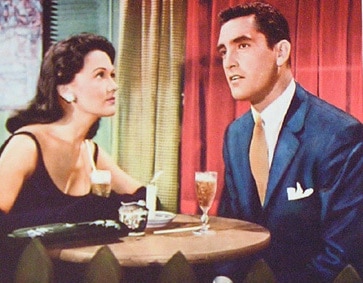
It’s fine to look away from someone when you’re trying to gather your thoughts.
Also note that it’s quite normal and appropriate to break eye contact and look away from someone as you recall a memory, mull something over, or gather your thoughts about what you want to say next.
When you break your gaze, look to the side, not down. Looking down when you break someone’s gaze signals lower-status, shame, and/or submission. Not the kind of message you want to convey. Instead, break your gaze horizontally.
Work your way up. Improving your eye contact is something you can do relatively quickly and easily. It just takes practice. Start out by increasing your eye contact with your family; you may find you don’t even look your own brother in the eye when you talk to him. Then increase your eye contact with your friends, and then your co-workers. As you start to feel more comfortable holding people’s gaze, work on making eye contact with salespeople and waiters. Finally, start making eye contact with strangers and new people you meet. Before long you’ll be a veritable eye contact expert!
Eye Contact Tips for Specific Scenarios
In Business and Sales
When giving criticism/feedback to an employee. Sitting directly face-to-face makes the conversation seem more intimidating and interrogation-like. Instead, sit across from the employee at about a 45 degree angle, with the hand you’re writing with closest to the employee. This angled position makes it more natural for you to oscillate your gaze between the employee’s eyes and the paperwork in front of you.
When trying to make a sale. If you’re a salesman, making eye contact with potential buyers is important in building trust and rapport, but it’s also useful to watch for when they make eye contact with you. They’ll often do that when you’ve said something that especially interests them, so pause and expand on that point or product feature.

When you’re making a pitch. Make eye contact with everyone in the room. Don’t make eye contact with the president but not the veep. Don’t forget to make eye contact with the secretary too.
In a job interview. In a job interview, eye contact is second in importance only to dress when it comes to nonverbal influencers. One study found that interviewers “were more likely to hire and rate as credible and attractive interviewees who maintained a normal or high degree of gaze than those who averted their gaze.” So be sure to make good, solid eye contact with the interviewer using the tips above.
When You Want to Intimidate
Make more eye contact when you speak than when you listen. People who have higher-status make more eye contact when they’re speaking, and less eye contact when they’re listening; this shows power. Those with lower-status do the opposite, and this shows submission. A high ratio of speaking to listening eye contact is referred to as visual dominance.
Now keep in mind that in most interactions, even if you do actually have higher-status than the person with whom you’re conversing, the best way to go is to make equal amounts of eye contact whether you’re speaking or listening. It pays to make a lot of eye contact when listening, as it makes the other person feel important, and making other people feel important is the linchpin of becoming charming and thus persuasive. Famously charismatic men like Ronald Reagan and Bill Clinton were well-known for their ability to make each person they met feel like no one else in the room mattered, and they did that by locking eyes with the person and really listening to him or her.
But in situations where it would be advantageous to show that there’s a pecking order, and that you’re on top of it, try making more eye contact when you speak and less when you listen.
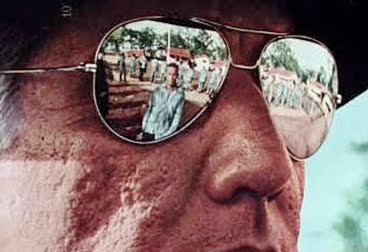
Hide your eyes. When someone covers his eyes, the communication and feedback between him and another person becomes one-sided. The “eye-less” guy can see what’s going on with the other person, but the other person doesn’t know what’s going on with the eye-less guy. This is why studies have shown that those who cover their eyes seem more powerful and in control—although this imbalance also naturally creates resentment from those they interact with. This is why police officers in mirrored shades can seem intimidating, why people who wear sunglasses indoors tick other people off, and why Darth Vader is so dang scary.
Stare ‘em down. When you can’t or don’t want to cover your eyes, but you still want to intimidate someone, it’s simply a matter of staring them down and not being the one who looks away first. The person who maintains his gaze shows dominance and higher-status, while the person who looks away first signals their submission. Maintaining your glare shows that you’re confident, which can sometimes help psyche out an opponent, or convince the guy who wants to fight you at the bar to back off.
MMA fighters are masters of the stare-down:
Meeting the Eyes of a Stranger on the Street
First, why would you want to do this anyway? Well Michael Ellsberg argues that making eye contact with strangers you pass on the street is not only excellent practice for making eye contact with people you actually know, and can lead to getting more dates, it can even “transform the urban landscape:”
“Before I started doing this, I would walk around the city and mostly view the other people I encountered as obstacles or annoyances. But once I started doing it—once I started looking into the windows of hundreds of people’s souls each day—the whole scene shifted. I suddenly saw so much beauty out there, so much sadness. So many heavy burdens, so much joy…The city became a symphony of emotion—all from this simple shift.”
According to Ellsberg there are a few keys to successfully making brief eye contact with strangers on the street, and they basically all revolve around the fact that you don’t want your eye contact to make people feel threatened. First, he recommends keeping your facial expression neutral and your gaze soft—the eye and face muscles are relaxed–no laser-eyes. Second, you don’t want to initiate eye contact with someone from too far away; you should attempt to make eye contact with the person when you’re about 4-5 paces from crossing paths. Finally, only look into their eyes for a quick moment—about one pace or just long enough to see their eye color.
When Talking to Other Men

As we mentioned earlier, eye contact creates physical and psychological arousal, increasing activity in the receiver’s prefrontal brain and speeding up their breathing and heart rate. For men, this physiological response can make a high-stakes conversation feel too confrontational. So when you want to talk to another man about something important, do it side-by-side—go for a drive, or a walk, or fishing together.
When Trying to Woo Women
Eye contact is one of the best ways of building attraction with the ladies and is beneficial in every stage of a relationship:
The Initial Encounter
Making eye contact with a woman. While you may think of your level of attractiveness as set in stone, studies have shown that how attractive you look to others is influenced by things like your facial expression, and, you guessed it, whether or not you’re gazing in their direction. Simply looking at a woman directly, while also smiling, makes you appear more attractive to her. The most attractive face to show a woman is one with direct eye contact, a relaxed face (don’t show tension, especially in your jaw), and an easy smile.
If a woman meets your eyes, don’t be the first one to look away. Remember, the person who holds the gaze longer shows power; you’re not literally trying to assert your superiority here—holding your gaze simply signals your confidence, which is attractive to women.
Interpreting her eye contact. When you look over at a woman, she will usually look away, whether she’s interested in you or not. But the way in which she averts her gaze tells you a lot about whether she wants you to approach her or not:
- If she looks down and then looks back at you less than 45 seconds later, she is almost definitely interested. This sign is so nearly fail-proof that you don’t need any smooth pick-up lines when you approach her—just offer your hand and introduce yourself.
- If she looks away horizontally, she’s not sure if she’s interested in you or not yet. Smile and make eye contact again to see how she reacts.
- If she averts her gaze by looking up, she’s not interested. Basically, she just rolled her eyes at you.
After You Meet
Once you’ve caught a lady’s eye, and have started talking with her, don’t let up on the eye contact, because it will continue to reap benefits. In our previous article, we talked about the way in which eye contact fosters intimate bonds, and that’s a boon if you’re trying to win over a woman.
In a study conducted by Dr. Arthur Aron, strangers were brought into a lab and paired off into opposite sex couples. The newly-formed couples who were asked to look into each other’s eyes for two minutes straight later reported feelings of attraction, affection, and even love for their partners. One of the couples even went on to marry.
Once You’ve Been Together Awhile
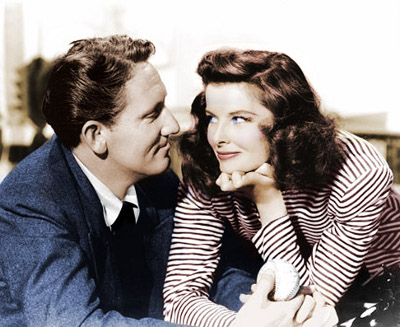
So eye contact can help initiate a relationship and then deepen its intensity. It can also keep feelings of love alive in the long-term. Studies have shown that couples with the strongest love for each other also make the most eye contact and hold mutual gazes for longer periods of time. Now correlation isn’t causation—does gazing at each other more keep you in love, or is it just that those who are in love want to look at each other more often? Probably more of the latter, but it certainly couldn’t hurt to try to “see” (in the Avatar sense, naturally) your partner more often. Make some googoo eyes over dinner from time to time.
When Giving a Speech

Speakers who make eye contact with the audience are perceived as more trustworthy, competent, and confident. Eye contact also helps you build a greater sense of intimacy between you and your audience, and this connection creates ethos; which in turn makes your message more convincing. Someone who’s constantly looking at their notes seems nervous (Do they have something to hide? Are they not competent enough to prepare adequately?) and is more likely to be dismissed.
When you’re speaking to a large audience, it is of course not possible to make eye contact with each and every person in attendance. Some people will tell you to fake it by looking over everyone’s heads—but you won’t convince anyone with that method. You also shouldn’t do the head bobber thing where you look at your notes for a second and then quickly at your audience and then back at your notes…Finally don’t “spray” your gaze over the audience like you’re shooting it from an aerosol can. Instead, you want to make actual eye contact with individual members of the audience.
In order to be able to do this, you first need to try to memorize your speech, and if you can’t do that in its entirety, then create an outline with just your main points, so that you only have to look down a few times to find your way.
Now that your eyes are free to roam around the room, you can go about making eye contact with folks in the audience in a few different ways, depending on the size of the audience:
30 people or less. When you’re addressing a small group, say around a conference table, don’t keep moving your gaze clockwise or counterclockwise around the table, stopping to make a few seconds of eye contact with each person before sweeping around again. People will begin to anticipate and sort of dread their “turn.” Always be looking at someone, but keep who you look at random and mix it up throughout your presentation.
30 or more people. Try the triangle method; it’s much like the triangle method for face-to-face interactions mentioned above, only with whole persons swapped for the individual’s eyes and mouth. Imagine an invisible triangle sitting on top of the audience. You make eye contact with a person on the right side point of the triangle, and then the top point, and then the left point. Then repeat. To mix it up and keep your pattern from becoming predictable, you invert the triangle from time to time.
75-300 people. Divide the audience into five imaginary groups, and then move your gaze from group to group, picking a different person within the group to make eye contact with each time.
300+ people. If it’s a very large audience, then focus your eye contact on people in the first few rows, while also looking out into the crowd from time to time.
With any of these methods, the key is to move your gaze from person to person very casually and smoothly. You don’t want it to seem jerky…”You there! Feel the weight of my eyes! And now you! Now you!”
3 final tips for speeches, regardless of audience size:
Open with eye contact. When you get to the podium or the front of the room, take a few second to smile and make eye contact with people before you even begin speaking. This starts you off on the right, connected foot.
Don’t keep your eyes glued on the Powerpoint slides. First, you should take the advice of Alex Hunter and keep your slides extremely simple and clean. And second, you should be extremely familiar with what’s on each slide so that you don’t have to keep looking at them and boring the pants off people by reading the slides to them.
Look at both friendly faces and hostile faces. Don’t just make eye contact with the friendly faces in the crowd. Look at the hostile, bored faces too. Making eye contact with them could soften them up a little for your message. But after looking at a hostile face for a bit, then look at those who are beaming up at you to keep your enthusiasm from flagging.
Don’t forget to make eye contact with people at the end of the speech. It’s easy to get caught up in rushing to finish, but the crescendo is when you really want to leave an impact. Be sure to look into people’s eyes as you close to really drive your message home.
Note: The principles in this series are written for men who live in Western countries. The importance of eye contact and how to make it can vary from culture to culture.
Check out my podcast on the importance of face-to-face communication:
Sources:
The Power of Eye Contact: Your Secret for Success in Business, Love, and Life by Michael Ellsberg
Handbook of Interpersonal Communication by Mark L. Knapp and Gerald R. Miller
Sex Signals: The Biology of Love by Timothy Perper
“Learning the Look of Love” by Cheryl Murphy
Communication Theory by C. David Mortensen



